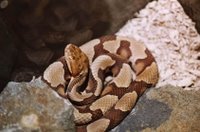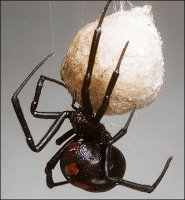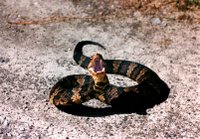Snakes and Spiders
Did you know that this state has the highest incidence of venomous snake bites in the whole of the United States? I'm not sure why this might be, but I'd like my family to not become a member of this statistic.
I know that any Americans reading this are likely to think that this is a load of fuss-and-nonsense about nothing. But, to give you some context:
In England, the children say, "Can I play in the back garden?" and I can just say "OK." This is because, in the UK, there is nothing in nature that can seriously harm you (unless you're allergic to bee stings or something). Snakes are few and far between and only one species is venomous (the Adder). I lived in England for over 30 years and have never seen a snake in the wild. Spiders are common, but are all harmless. Accidentally walking through a spider's web is no more than an inconvenience.
In the USA, playing in the back garden introduces a whole new risk factor of encountering creatures that can hospitalize you. Locally, our state boasts 37 species of snake, 6 of which are venomous. Our house is on the outskirts of the city, so is in a rather rural setting. Snakes-wise, our back garden (actually, it's a wood that runs across several people's land, but without fencing) mainly plays host to the Cottonmouth (a type of Water Moccasin) and the Copperhead. We are also known to have the brown recluse and black widow spiders.My first thoughts were "What on earth did we think we were doing, leaving our lovely England to go somewhere, where even the children's playing in the garden is dangerous?" However, the locals seem to be able to take it in their strides, so why shouldn't we?
I think that the danger may be more pronounced if we are naive. Local children know not to turn over rocks and logs; or put their hands in crevices or places where they can't see what's there. Local people know to use sticks and to wear ankle high boots in the woods. I've also noticed that local children know how to tell one snake from another. They know which snakes are poisonous and which are not. They also know what the rattle of a rattlesnake sounds like. My children, however, are innocent of all such matters.
The plan is to get educated and educate them. I don't want to scare my family, but I do want them to know how to behave.
During this winter I plan to teach them:
- how to behave when in the woods or in the under-house storage area.
- how to tell a venomous snake from a non-venomous one (although non-venomous ones can still bite).
- what to do if they see a snake, spider or spider's web.
I also plan on learning some first aid. Snake and spider bites are rare (about 8000 venomous snake bites a year across the whole of the US), but they are avoided by people knowing how to behave and what to do.
If you're planning to move to the US and you don't like snakes and spiders, I suggest getting a house with a nice, well cut lawn, where such creatures are unlikely to venture. Otherwise, it's probably best to get clued up.





4 comments:
I like your prose and the look of you blog, as well- beautiful photos, too.
Hey, It could be worse ... you could have moved to Louisiana, the state where the most people catch leprosy in the US :-) I'd suggest moving out here to California, but we not only have snakes and spiders, but also those pesky earthquakes.
Much as I've enjoyed handling snakes, from garter snakes through to various pythons, I've only once trodden, accidentally, in the vicinity of an adder's nest ... although unscathed by the experience that spooked me enough to not want copperheads, cotton mouths and rattlers on my doorstep! Sounds like you could do with a visit from St.Patrick!
I live in (very) southern California, and I have personally killed 3 rattle snakes in my garage over the years. I hated to do it, but I have young children and dogs, and can't take the chance. I have also killed many, many black widow spiders, and am thankful that neither my kids nor my dogs have been bitten.
Oh, and we do have those pesky earthquakes, too!
Post a Comment